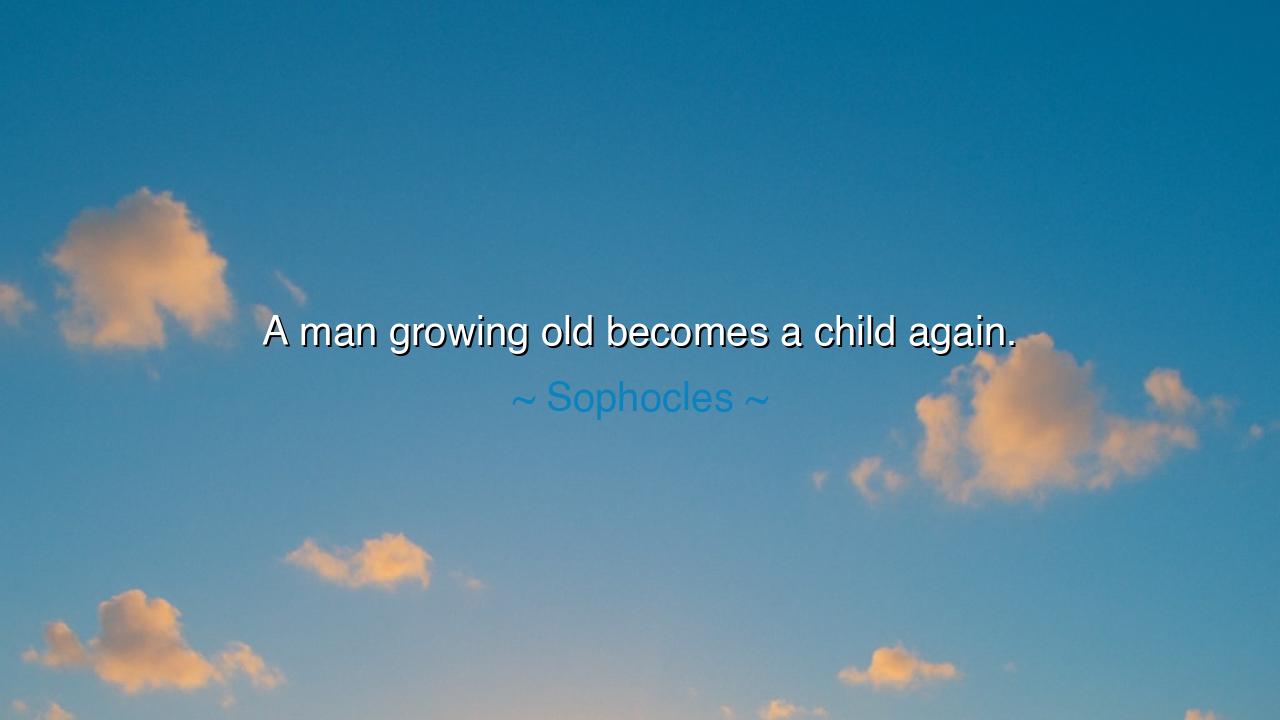
A man growing old becomes a child again.






"A man growing old becomes a child again." - Sophocles. These words, steeped in the wisdom of the ancients, encapsulate a truth as old as time itself: that the cycle of life is one of return, of becoming again what we once were. The man who was once strong, wise, and capable, who carved out his place in the world, finds in his later years that he is drawn once more into the simplicity and vulnerability of childhood. There, in the twilight of life, he may rediscover the innocence and dependence that once marked his earliest days. This truth is as profound as it is universal: age humbles us, and in our final years, we may return to the state of need, of helplessness, and of a child's wonder.
Consider the life of King Lear, a figure from the very heart of the ancient Greek tragedies. As Lear ages, he grows increasingly unpredictable, his mind descending into confusion and madness. In his old age, he no longer commands the loyalty and respect he once did, but instead finds himself dependent on the very daughters who once relied on him. Lear's tragedy is a manifestation of Sophocles' words, for in his descent into old age, Lear becomes a child once again—vulnerable, helpless, and at the mercy of others. The mighty king, who once ruled a vast empire, now must rely on others for care, becoming as dependent as an infant, his strength and clarity fading with the years.
Sophocles' wisdom also speaks to a deeper spiritual truth: that age brings not only a loss of physical strength but a return to innocence. The child, unburdened by the complexities of the world, lives in a state of pure wonder and trust. As a man grows old, so too does he find himself, perhaps unwillingly, stripped of his armor—his intellect, his power, his self-sufficiency—and returns to the very essence of his being. In this state, the old man is again free to marvel at the world as he once did, as a child, unencumbered by the worries of life. In this return, we find both sorrow and grace: sorrow for the loss of power, but grace in the simplicity of humility.
Take the example of Leonardo da Vinci, who, even in his later years, continued to create with the fervor of a child, full of curiosity and creativity. Though his body had grown weak and frail, his mind remained sharp and youthful, ever searching for new discoveries and creations. Yet, as his life drew to its close, he too became more dependent on the kindness of others, relying on his pupils and friends to assist him in his work. In his final years, Da Vinci found himself in the very position that Sophocles describes: a great man, a giant of his age, returning to a place of dependency and simplicity, much like the child he once was. He had lived a life of innovation and mastery, yet in the end, even he could not escape the tender embrace of old age.
This return to childhood in old age is not merely a physical or emotional regression but also a spiritual lesson: that as we age, we must learn to accept our vulnerability, our dependence, and our innocence once more. Just as a child relies on others for care, so must the elderly, at times, allow others to care for them. The lesson is not one of weakness, but of grace and surrender. To grow old is to let go of the pride and arrogance that youth often brings, to accept that we, too, must rely on the compassion and love of those around us.
The practical lesson to draw from Sophocles' words is simple yet profound: embrace your age and the return to childlike wonder and humility it may bring. Recognize that old age is not a punishment but a return to a simpler, more honest state. Let go of the fear of dependence, and instead, celebrate the opportunity to once again see the world through the eyes of a child. Life is cyclical, and in its later stages, we are given the gift of rediscovering the purity and trust we once had as children, free of the burdens of the world.
Therefore, accept the vulnerability that comes with aging, but do not see it as a loss. It is a return to the source, a return to the humble, curious, and trusting nature of the child. Embrace the simplicity of the moment, and allow yourself to experience the world anew, just as you did in your earliest years. In this return to childlike wonder, you will find peace, grace, and a deeper connection to the very essence of life.






AAdministratorAdministrator
Welcome, honored guests. Please leave a comment, we will respond soon